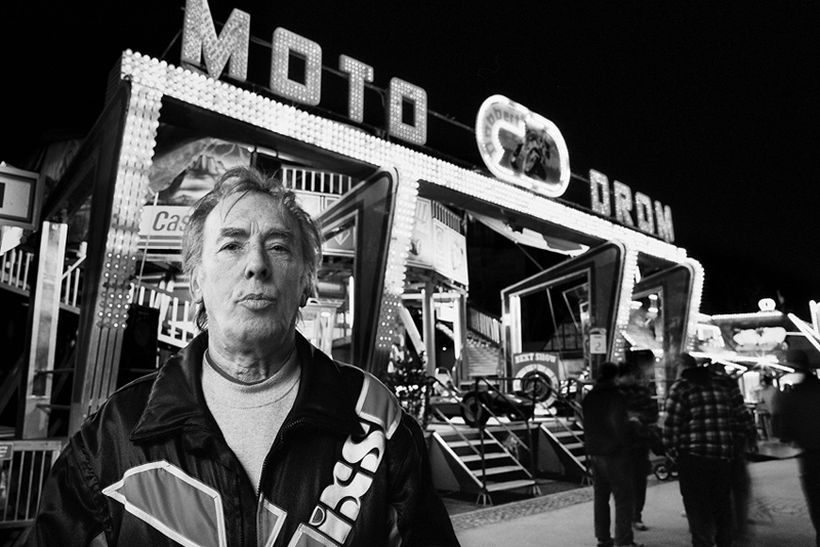
MOTODROM © Jörg Wagner
After focusing in past editions of our Filmmaker Portrait primarily on artistic achievements, today we would like to introduce Germany’s most commercially successful short-film maker, Jörg Wagner. With STAPLERFAHRER KLAUS – DER ERSTE ARBEITSTAG, by now a cult classic, he made his way from splatter forums onto the video shelves of major retailers and can definitely hold his own there with the blockbusters in terms of popularity. At the end of January, Wagner celebrated another triumph, this time at Sundance with his second short film, MOTODROM.
Jörg Wagner knows the short film scene backwards and forwards: born in 1967 in Stuttgart, and now living and working in Hamburg, he trained as an AV media designer, directed various stage shows, and hosted events. He was already able to start living out his fascination with short film in 1996 as an employee of the Hamburg Short Film Festival, where he directed the distribution department of the Short Film Agency for a few years. Wagner is thus a prime example of the fact that – in Hamburg especially – the border has never clearly been drawn between enthusiastic short-film viewers or festival organizers on the one side and active producers on the other. “The impulse to make a short film starts with an idea that I urgently want to realize”, says Wagner when asked what motivates him as filmmaker. After making various trailers and commercials, one such idea led him to produce an elaborate 10-minute short.
Co-developed with Stefan Prehn, STAPLERFAHRER KLAUS – DER ERSTE ARBEITSTAG is a short film that was aptly described by one critic as “Peter Jackson films ‘The Seventh Sense’ (a traffic safety show on German TV)”. The illusion of a run-of-the-mill training film is built up carefully within the first few minutes using all of the well-known aesthetic and dramaturgical tools at the filmmaker’s disposal: a tactic that, particularly owing to the familiar voice of “The Seventh Sense” speaker Egon Hoegen, succeeds brilliantly. The ensuing splatter is then staged with great attention to detail, resulting in a wonderful piece of sophisticated trash that strangely enough has become very popular for use in occupational safety training.
Despite high “production values” and largely professional working conditions on the set, the makers were completely taken by surprise by the resounding response to their film. “We had no idea our film would be such a hit”, Wagner commented. Following its festival premiere in early 2001, STAPLERFAHRER KLAUS was screened at over 100 international short film festivals, including as competition entry in Cannes. It won 17 awards, including the German Film Critics’ Prize as best short film of 2001 and the Friedrich Wilhelm Murnau Short Film Award.
But this massive festival exposure was even topped by the success of the DVD. While sales for short films are usually in the three-figure area, STAPLERFAHRER KLAUS, packaged with 75 minutes of bonus material, sold over 250,000 copies in Germany – thanks to a good choice of sales channels including the rummage tables at electronics retailers Saturn and Media Markt.
Despite all this success, however, we have had to wait a full five years for Wagner’s next production. His MOTODROM, a short documentary with powerful imagery that premiered in January 2006, has now attracted the undivided attention of the scene. For nine minutes, the experimental short with its dreamlike black-and-white images immerses the viewer in the world of the so-called “hellriders”, daredevils who cling with their motorbikes to the steep inner sides of a barrel in a dying fairground attraction. Wagner enlists all the rules of documentary suspense to help the viewer experience the fascination of the riders’ stunts, without however glossing over the tragedy of the theme. That he succeeds is not due alone to the film’s compellingly aestheticized black-and-white look, which shows the faces of the audience as well as the breathtakingly steep ride from the perspective of the motorcycle driver. Sound design also takes on special significance here, dominated by the hellish noise of the roaring motors, since not a word is spoken in the film. As a critic rightfully remarked, Jörg Wagner has created with MOTODROM one of the great documentaries of the past few years, one that radiates a timeless beauty that was often thought lost in the documentary film world. After over 60 festival invitations worldwide and diverse prizes – for example the ZDFdokukanalpreis (the documentary award of a German public TV station) at the International Short Film Festival in Hamburg, a nomination for the German Short Film Award and First Prize at short cuts cologne – the film was given an honourable mention at the Sundance Film Festival at the end of January 2007.
In view of his biographical roots in short film and his extraordinary accomplishments thus far, it hardly comes as a surprise that Wagner resists the classification of short films as a preliminary stage in a filmmaker’s career. “I think that viewing the short film as calling card is problematic”, he comments, criticizing the widely held prejudice that short films are merely practice exercises for up-and-coming feature-film makers. Appreciation for the genre on its own merits, similar to that enjoyed in the literary realm by the short story, is largely lacking in Germany, however, reflected for one thing by the dearth of financing opportunities faced even by a successful filmmaker like Wagner. “Instead of two or three short-film projects, usually only one film is funded, or significantly less money is made available.” He was able to finance his new film only through major delays in salary payments.
And even a short film as popular as STAPLERFAHRER KLAUS is not sufficient for earning a living. Jörg Wagner supports himself by writing screenplays for television rather than with the cinematic equivalent of the short story.
(MJ)